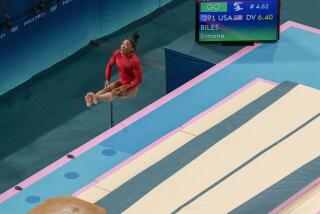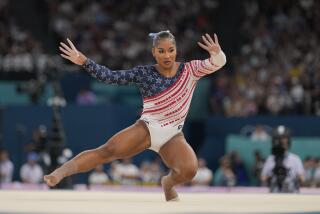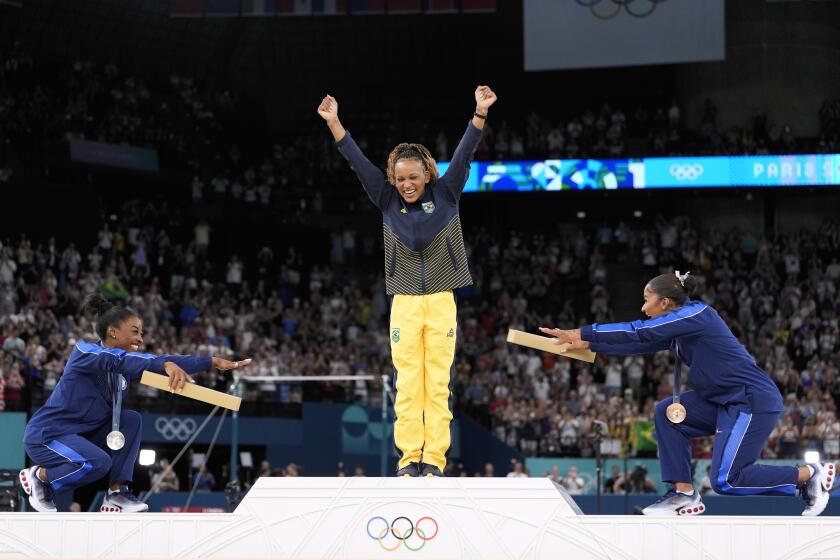A Truly Re-Vaulting Development
SYDNEY, Australia — The mistake could have caused serious injury.
Elise Ray did her first warmup vault and landed flat on her back. As Ray struggled to catch her breath she had a thought. “I was scared,” Ray said. “I was very, very scared.”
The mistake at the Olympic women’s all-around final Thursday at the Sydney SuperDome overshadowed the tremendous accomplishment of three Romanian gymnasts.
A tiny, dancing, sparkling 16-year-old named Andreea Raducan; a majestic 20-year-old named Simona Amanar; and a quiet, competent 18-year-old named Maria Olaru, beat the world.
The mistake was inexcusable and inexplicable.
Allana Slater of Australia, while warming up for her vault on what would be the third rotation, pointed out the discrepancy to her coach.
Through the first two rotations, it turns out, 18 gymnasts leaped over a vault that was five centimeters--about two inches--too low.
“This is a major blemish on the Olympics,” said 1984 men’s all-around silver medalist Peter Vidmar.
“This would be just like if you make the track the wrong size,” said Bob Colarossi, president of USA Gymnastics.
It would not have been a triumphant night under any circumstances for the Americans. Ray ended up 14th after redoing the vault. Amy Chow, 22, a Stanford pre-med student, finished 15th; Kristen Maloney, a 19-year-old UCLA freshman-to-be from Pen Argyl, Pa., was 20th.
Maloney jumped on the low vault but adjusted well enough to score 9.543.
The misplaced apparatus caused gymnasts who rely on precision, who make chalk marks and count steps for every approach, who assume a vault is where it is supposed to be, to fall and cry.
Ray, the U.S. national champion, kept shaking her head after the warmup fall. Then she landed on her bottom on both her competition vaults, scored a 7.618 and finished 35th out of 36 competitors before the redo, which jumped her to 14th.
Svetlana Khorkina, the elegantly tall Russian who had been a favorite to win her first Olympic all-around championship, had scored a 9.812 on her difficult floor exercise and walked to the vault, her next event, with her head high.
But on her first attempt, unable to get enough height, Khorkina landed hard and fell to her knees. The 21-year-old Russian who moves as if floating above the world, aware of nothing but herself, was stunned. She completed her second vault with tears in her eyes. Her combined score was 9.343 and Khorkina angrily waved off a Russian coach who tried to console her.
When she reached her next rotation, the uneven bars, a place where Khorkina excels, she fell on her first release move.
“‘The vault was too short for her and she knew it was too short for her,” said Valeri Dianov, an official with the Russian team. “She’s No. 1 on the Russian team, she’s been a world champion and a European champion and we expected she should be Olympic champion. She is emotionally depressed.”
While five gymnasts, including Ray, decided to take advantage of the chance to redo their vaults, Khorkina did not. She could not have risen from her 11th-place standing to a medal.
Ray expressed what Khorkina might have been feeling.
“I’m extremely disappointed,” the 18-year-old from Columbia, Md., said, “and it also makes me really mad. I thought something was wrong when I fell the first time, but then you think that this is the Olympics and it must be nerves.”
Equipment was reset after the men’s all-around competition on Wednesday night.
Slava Corn, president of the media commission for the Federation Internationale de Gymnastique (FIG) technical committee, said she could not say with any certainty what had gone wrong.
“Numerous individuals--competition managers, technical delegates, head judges--all should check the equipment,” Corn said. “Unfortunately a mistake was made.”
Slater said she noticed the mistake because the vault always hits her coach at the same place. “My coach stood next to the vault,” Slater said, “and I said ‘Nah, that can’t be right unless he’s grown.’ ”
Suddenly a gaggle of officials with stiff faces had the measuring sticks out.
“It was unbelievable,” said Donna Strauss, Maloney’s coach. “This doesn’t happen at local competitions.”
While an arena full of confused people were watching gymnasts reassemble to compete on the adjusted vault for a second time Raducan, the gold medalist, was smothered in a bearhug from Romanian Coach Octavio Belu. Then Raducan scrambled onto his shoulders so she could see all around.
Raducan is only 4 feet 10 and weighs 82 pounds. She has wide, dark eyes and a perky ponytail. There is a resemblance, in personality and appearance, to Romania’s last all-around champion, Nadia Comaneci.
On her last routine, the floor exercise, knowing the gold medal was hers to win or lose, Raducan sparkled. Tumbling, twisting, twirling, bending, laughing, Raducan used music from “Riverdance” to showcase her star power.
The judges gave Raducan the highest score of the night, 9.825, and Raducan may still not believe what has happened.
“It’s like having a dream, a nice dream,” Raducan said.
This is the first time since 1960 that a single country has swept the all-around medals. Then it was the Soviet Union. This time the Romanians, who also took team gold, are the dominators.
Raducan also vaulted before the mistake was caught. But she scored a 9.706 and never felt anything was off.
Belu, who succeeded Bela Karolyi as Romania’s coach in 1981, says that while his country is in disarray and the facilities deteriorating, he finds in his gymnasts a will to win.
“I try to push to have this kind of spirit for my girls,” Belu said. “I want them to want to be the best.”
The U.S., meanwhile, is working on its worst gymnastics performance since 1972. Combined, the men and women have won no medals.
Blaine Wilson and Morgan Hamm have qualified for, respectively, the vault and floor exercise finals. Ray has qualified for the beam final.
Thank goodness it’s not the vault.
More to Read
Go beyond the scoreboard
Get the latest on L.A.'s teams in the daily Sports Report newsletter.
You may occasionally receive promotional content from the Los Angeles Times.







